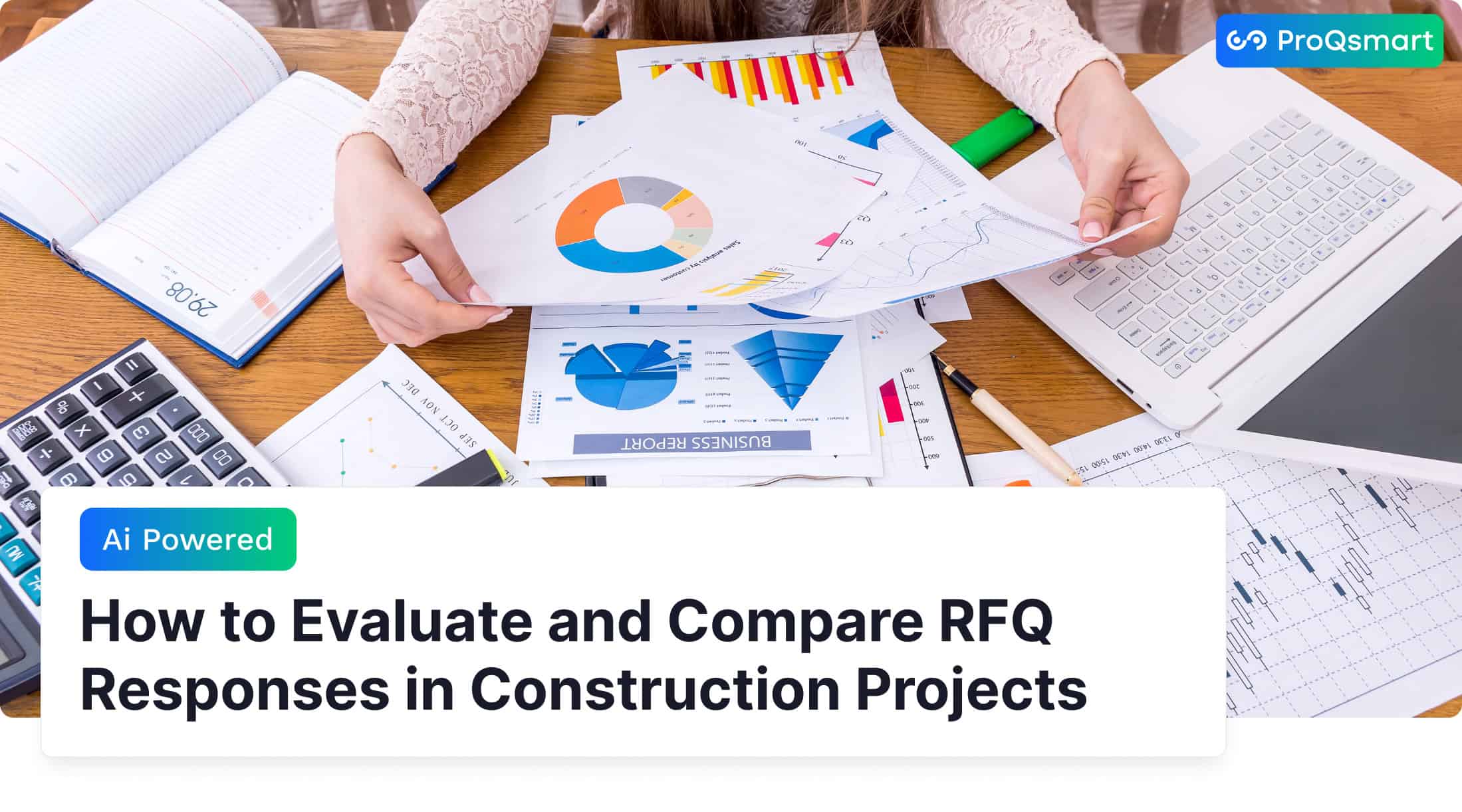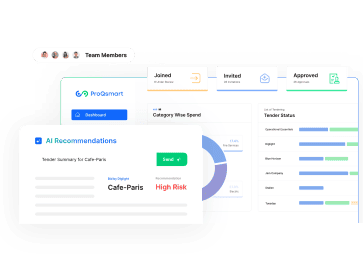Ever wonder how to pick the best RFQ in construction? Comparing RFQ responses is the big deal. You have to know this stuff you’re looking at in order to make wise decisions.
We’ll walk you through it step-by-step so you don’t lose any business. It’s kind of like previewing a new gadget before making the purchase. You look for specs, quality, and price, right? Same deal here.
We’ll call out the important ones and best practices for you to be able to choose the right one every single time. You’ll know the ins and outs, which will give you the confidence you need to make smart procurement decisions.
Stay tuned and you’ll be a pro in no time.
Key Takeaways
- RFQs, or Requests for Quotations, are critical in the construction industry. They assist in collecting specific pricing and service details from prospective suppliers or contractors.
- Wholly evaluating RFQ responses is key. It ensures competitive pricing and quality service for construction projects, determining their success.
- A structured review process evaluates each RFQ response for completeness, responsiveness, and competitiveness. This way, we can ensure that we are accounting for all technical and financial aspects.
- Having clear scoring criteria and getting stakeholders involved in the evaluation process increases decision-making and ensures that project requirements are fulfilled.
- Using a construction RFQ template can streamline the RFQ process. It ensures the information you ask of suppliers or contractors is uniform and transparent.
- A good place to start is by understanding the differences between RFQs and RFPs. In the procurement process, RFQs focus on pricing, while RFPs offer in-depth project solutions.
Understanding RFQ in Construction
When you work in the construction world, an RFQ, or Request for Quotation, takes center stage. Think of it as a game ticket. Owners and contractors line up like eager shoppers at the start of a sale.
An RFQ is a document you use to request quotes to perform specific tasks in a construction project. It’s like, “Well, let’s see what you’ve got, builders, and how much you’re asking me to pay for it.” Unlike RFPs (Request for Proposals) or RFIs (Request for Information), RFQs zoom in on costs.
They have more specific specifications because clients know what they need. This specificity ensures everyone’s on the same page, making it easier to spot qualified contractors.
What is an RFQ?

In construction projects, an RFQ focuses on finding the right fit for the right price. It requests contractors to submit a Statement of Qualifications (SOQ), demonstrating they have the chops to get the job done.
The RFQ is different from RFPs and RFIs. It’s focused on getting firm quotes rather than “shopping around” or looking for proposals. A typical RFQ document spells out what’s needed in plain terms, leaving no room for guessing.
It contains technical information, project timelines, and expectations. This clarity is essential for determining which contractors qualify to even bid.
Characteristics of Construction RFQs
Construction RFQs have special characteristics that make them different. They promote transparency, leveling the playing field so everyone gets a fair shot.
By laying out what’s needed, RFQs filter out unqualified bidders, honing in on those genuinely suited for the job. They can readily work on projects of all sizes, from a tiny office to a giant skyscraper.
This flexibility makes RFQs invaluable in shaping the procurement process to fit project requirements. The RFQ isn’t binding, which gives both sides room to adjust as things progress.
Key Elements of an RFQ
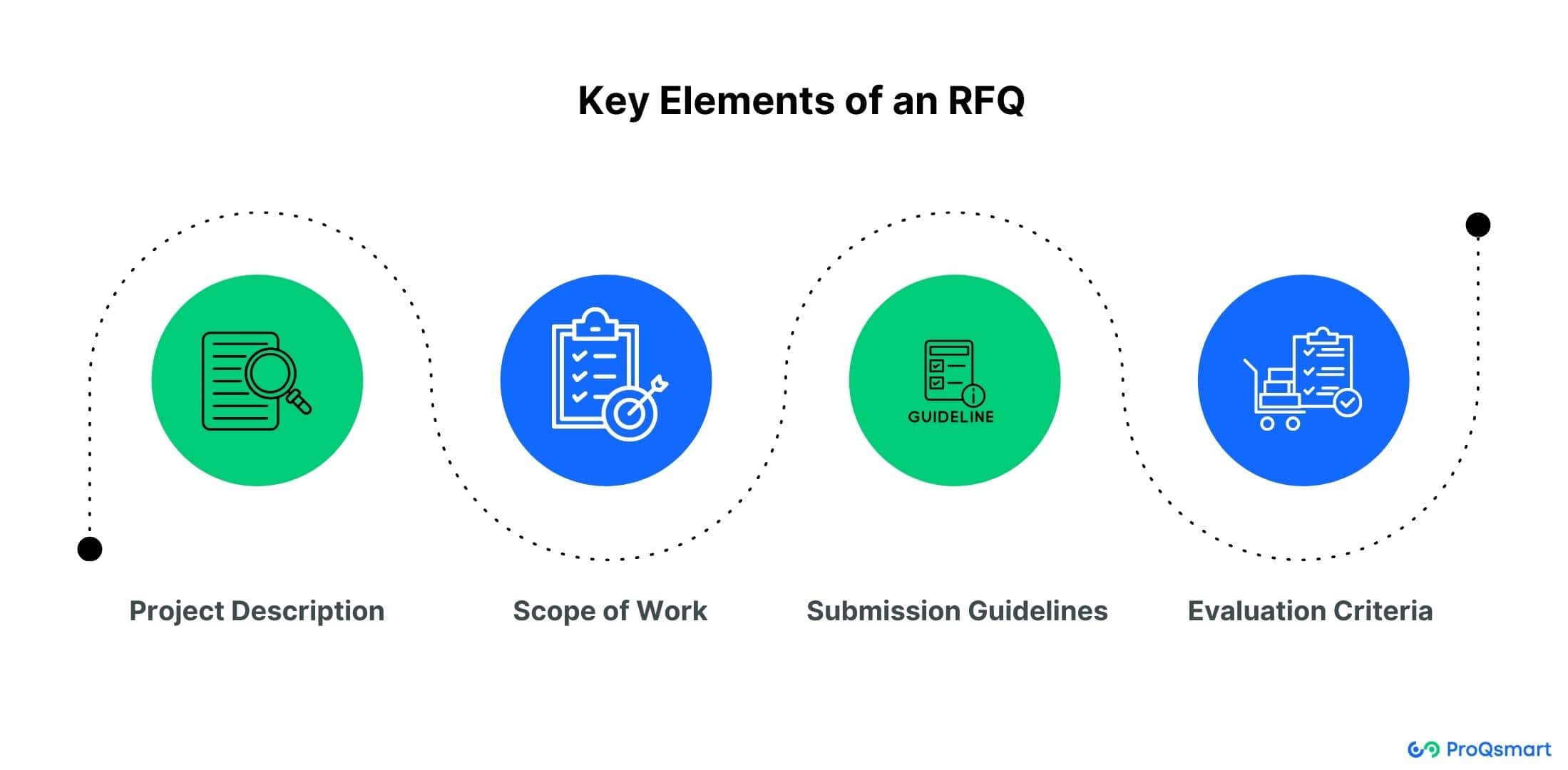
Here’s what you’ll find in a typical RFQ:
- Project Description: Clearly outlines what needs doing.
- Scope of Work: Details the tasks involved.
- Submission Guidelines: Specifies how and when to submit.
- Evaluation Criteria: Lists what’s needed to qualify.
When crafting RFQs, clear and concise language reigns supreme. It instructs contractors, making sure they never have to think about how to respond.
Specific instructions don’t allow for uncertainty, which makes everything run much more smoothly. Deadlines and submission guidelines make everything run more smoothly; you can expect to hear back quickly.
When RFQs are paired with RFIs and RFPs, supplier selection is faster and cheaper. RFQs provide detailed cost information, but they don’t create binding obligations. This flexibility is critical in construction, an otherwise chaotic industry.
Importance of Evaluating RFQ Responses
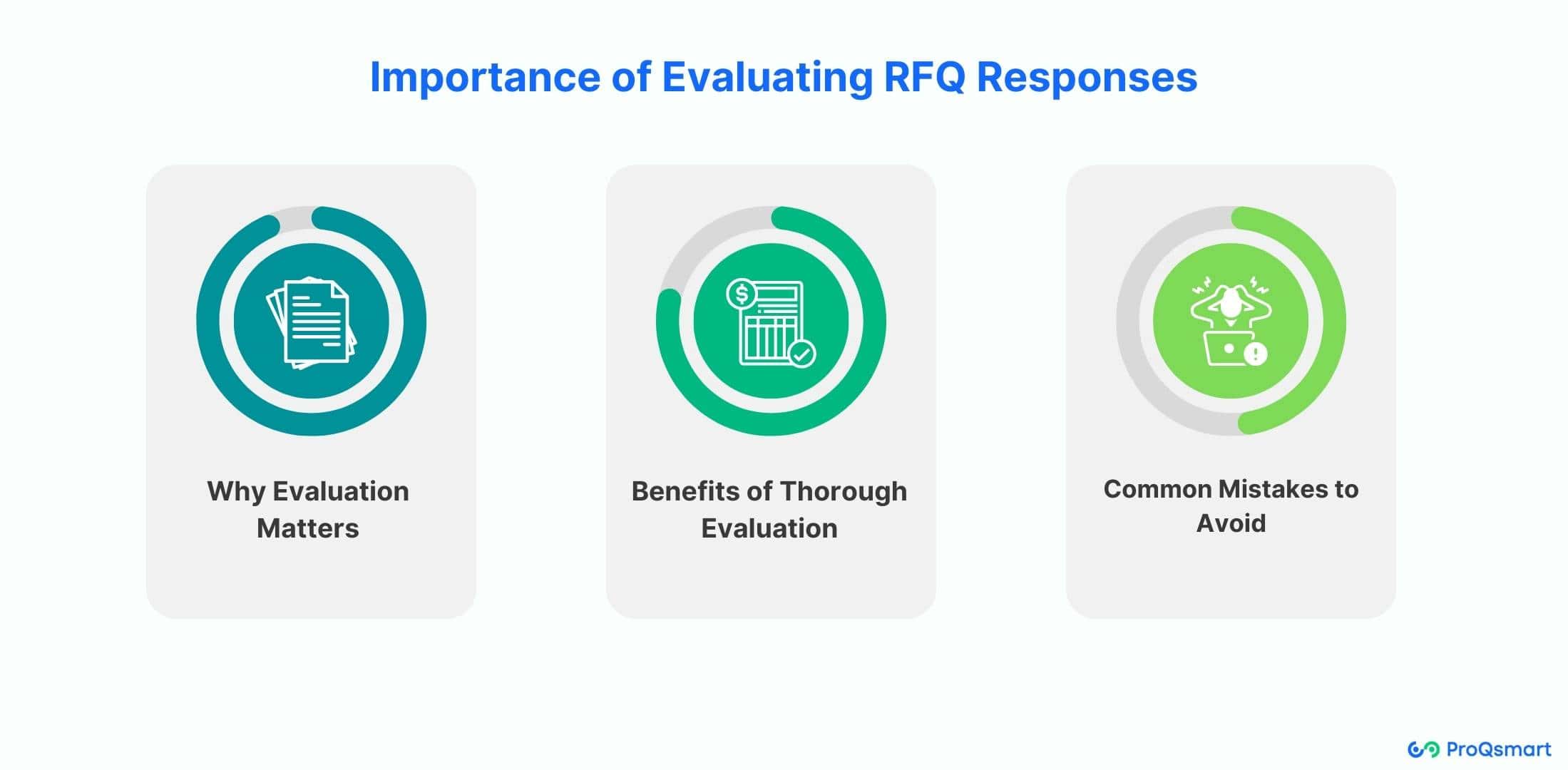
Evaluating RFQ (Request for Quotation) responses is a big deal if you want your construction project to go smoothly. Why? Well, it’s like this: when you evaluate thoroughly, you’re not just picking a contractor. You are setting the project up to get off on the right foot.
Think of it like dating before you marry someone. You want to know if the contractor can actually do what they say. This means checking their skills, their previous work, and whether they can work within a budget. A solid evaluation process can prevent nightmare scenarios. You’ll greatly reduce the chances of projects going over budget or getting delayed.
Why Evaluation Matters
When you read the evaluations deeply, you’re leading yourself toward wise choices. It’s about picking a contractor who is a glove fit for your project. The strength of your verdict determines how smoothly the project runs.
Skip this step and you’ll find yourself with overspending and missed deadlines. It’s important to measure that against what you want from the project. For instance, if you require eco-friendly materials, your evaluation should include contractors that specialize in that.
Benefits of Thorough Evaluation
Let’s see what you earn by investing the time required to truly evaluate RFQ responses. To start, you have a clear view of each contractor’s strengths and weaknesses. This can lead to better working relationships because you know what to expect.
When you evaluate well, you build trust and transparency. Everyone knows what’s expected, which means fewer surprises. If you select the right contractor, you’re creating a long-term relationship that’ll pay dividends on future projects.
Common Mistakes to Avoid
There are several common mistakes to avoid during the evaluation process. First, skipping detailed checks on a contractor’s past performance can lead to poor choices. Second, letting personal biases influence your choice can skew the results.
Important criteria include being legal and the previous project’s results. Additionally, not maintaining clear communication among evaluators sends mixed messages, which can confuse the decision-making process.
It’s critical to eliminate bias from evaluations. Keep it fair so you can make the best choice based on fact. Missing key evaluation criteria can risk the whole project, so stay sharp. I always make sure the evaluators are in alignment to avoid misinterpretation.
How to Evaluate RFQ Responses
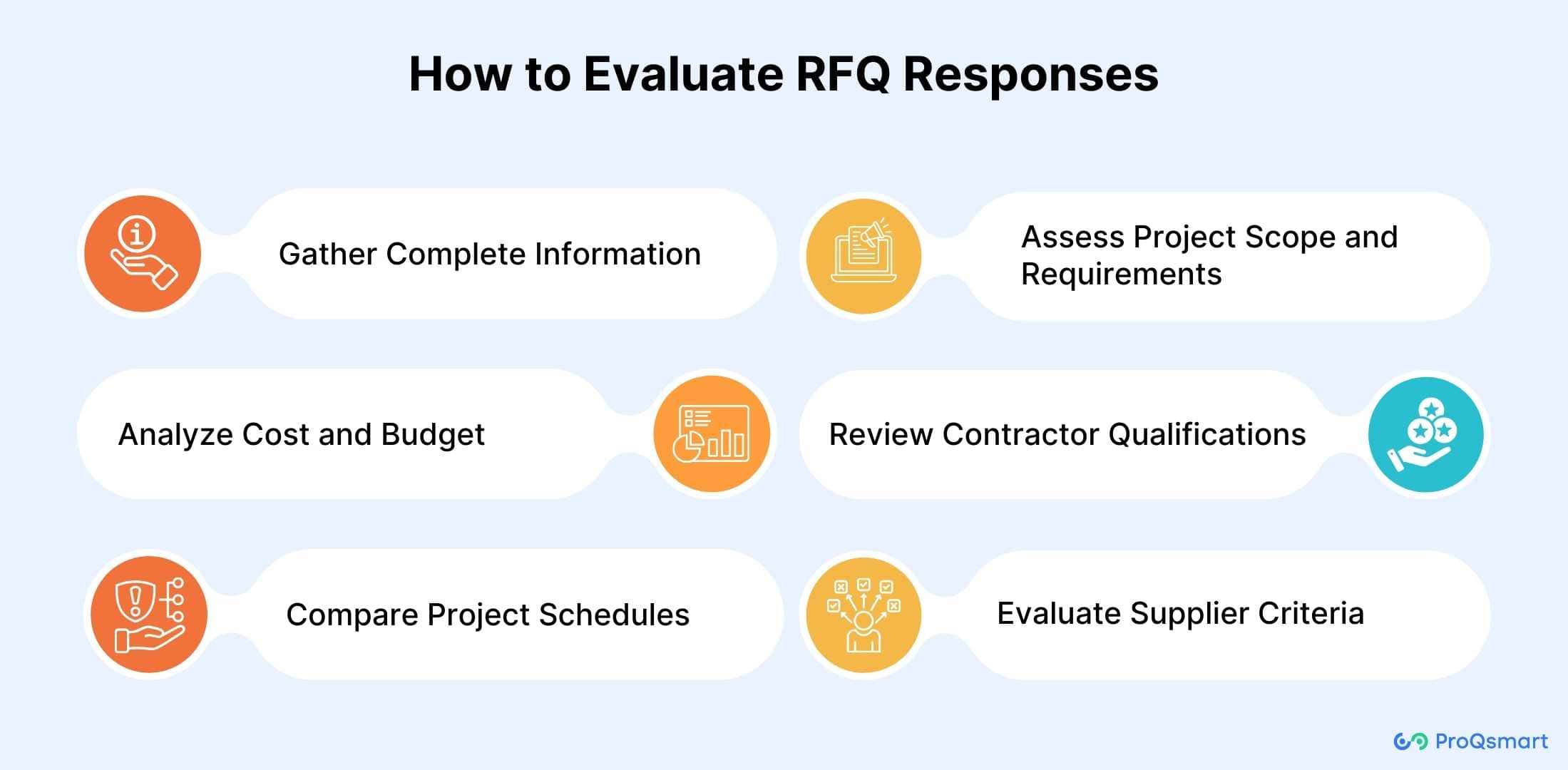
Reviewing proposals within the construction project management framework is a critical part of the success of a construction project. By taking a systematic approach, you can be an informed consumer and choose the right contractor for your project.
1. Gather Complete Information
Gather all the required information from the RFQ responses. It’s like assembling a puzzle, right? You have to have all the pieces before you can see the whole picture.
Checklists of required documents and data include bid documents, contractor qualifications, and safety management plans. Incomplete information really screws things up. If you feel like something’s missing or it’s not completely clear, shoot a request for information (RFI).
2. Assess Project Scope and Requirements
The contractor proposals must match your project scope and requirements. This will help you sort through the responses and have a better understanding of the project specifications.
Consider the complexity of the project and how well the contractors can handle it. These requirements need clarity, so get input from stakeholders to ensure we’re all aligned.
3. Analyze Cost and Budget
When considering pricing, pay attention to price estimates provided by contractors. It pays to make a table and put them alongside each other. Knowing what the breakdown of these costs will be ensures that it all lines up with what your project is trying to achieve.
The contractor should give you a breakdown of the estimate, with a margin of error of no more than 5%.
4. Review Contractor Qualifications
Watch for key qualifications in the contractor responses. Those include work for similar projects in the past, the ability to provide the necessary resources, and a solid safety management plan.
Make a list of these qualifications and check them against each contractor’s proposal. Check their credentials and references so you know they’ll deliver.
5. Compare Project Schedules
Evaluate the proposed project schedules from various contractors to determine whether their timelines appear realistic. A table is great for visualizing schedule comparisons, including milestones and deadlines.
Consider potential delays and how they will affect project delivery. It’s vital to find a contractor who can stick to a schedule.
6. Evaluate Supplier Criteria
Finally, assess the suppliers listed in the RFQ submissions. Compile a bullet list of essential supplier attributes, such as reliability and capacity.
Check their connections and previous work to ensure they will add value to your project.
Best Practices for RFQ Evaluation
If you’re in construction project management, evaluating RFQs or Requests for Quotation can seem like a maze. By adhering to some best practices in the bidding process, we can make this construction process a whole lot smoother.
Use Templates for Consistency
Using templates is like having a reliable map for your RFQ evaluations. They provide a systematic method of evaluating quotes so that each bid is evaluated using the same criteria. Templates keep everything structured and straightforward — a necessity when you’re combing through a mountain of files.
When I was working on an RFQ for a financial forecasting tool, I had a template that I used to keep everything we required organized. It detailed the key specs, such as algorithms, integration abilities, and security.
Here’s what you might include in a template:
- Project scope and objectives
- Evaluation criteria
- Required qualifications
- Submission deadlines
- Pricing breakdown
Templates can be useful; don’t forget to customize them for individual projects. Every project has its own quirks, and a one-size-fits-all template won’t do the trick.
Leverage Resource Management Data
Data is your best friend when evaluating RFQs. By digging into your Resource Management data, you can make more informed decisions. Look at vendors’ past performance—did they meet deadlines? Did they provide good work?
Historical data gives you context, telling you who might be a good fit. Use data analytics to spot trends in contractor performance. This aids in predicting future outcomes based on past behavior.
Since real-time data access is critical, ensure you view the most current information during assessments.
Understand Requirements Fully
Before you start reviewing, ensure that you clearly understand the project requirements. Mistakes in understanding these will get you the wrong contractor, wasting your time and money.
The key is to communicate these requirements clearly to everyone involved. When I worked on a project, we had a requirements checklist template in Excel that made us put everything down. It acted as a guide during the review, so nothing was overlooked and everybody was aware of it.
Build a Strong Case in Responses
Contractors need to make their RFQ responses strong and effective. Focus on the evaluation criteria and keep your proposal clear and direct. Here are a few tips:
- Address all listed criteria directly
- Include clear timelines and methodologies
- Showcase past successes relevant to the project
- Use simple language and avoid jargon
A strong story that showcases the contractor’s strengths is essential. It’s more like telling a great story that demonstrates why they are a perfect “fit” for the job. They back up their claims with sound data and case studies.
Construction RFQ Template Overview
If you work in construction, having an RFQ template (Request for Quote) can be life altering. It’s like having a blueprint before you start building. It holds all of the basics such as the project specifications, dates, and assessment guidelines.
With a detailed template, the vendors know exactly what is expected, which makes it easier for them to prepare accurate bids. A structured format is vital; it helps keep everything in order and makes sure you don’t overlook important details.
Ian Jennings, founder of Harbour View Mortgages, requested algorithms and data security in his RFQ. He wanted to make sure that the financial forecasting tool was up to his standards. Getting this level of detail avoids misunderstanding later on.
Using templates saves a ton of time and ensures that your RFQ is kept complete. You don’t need to reinvent the wheel every time. Instead, you can tailor the template for each project’s specific requirements.
Bridgit, a leader in planning workflows and labor forecasting, notes the value of accurate data in its guide. It shows how critical accurate information can be to project calculations from the get-go. Customization is key because no two projects are alike.
Use the right template and customize sections for your needs. In this way, you make sure everything will meet the project’s goals — and the contractor’s capabilities.
Essential Project Information Needed
- Project name and location
- Timeline and deadlines
- Budget estimates
- Contact person and details
- Specific materials or services required
- Safety and compliance requirements
When presenting project details, clarity is everything. Full details in RFQs make it easier to compare contractors. When contractors collect all the necessary data, they can create accurate bids.
That accuracy makes it easy for you to select the right fit for your project. Accurate data, as Bridgit pointed out, prevents mix-ups and keeps everyone on the same page before the project begins.
Detailed Scope and Requirements
Defining the project scope in RFQs is like setting the GPS before a road trip. It tells contractors what to expect and what to do. Detailed descriptions help align contractor responses with your expectations.
Here’s what should be included in the scope section:
- Project objectives and deliverables
- Technical specifications
- Performance standards
- Quality requirements
A well-defined scope also makes it easier to judge whether a contractor can meet the project’s needs. Getting this alignment right is more critical than ever to project success and ensuring contractors have the capabilities to deliver what is needed.
Importance of Project Scheduling
Project scheduling is a backbone of any RFQ. It also affects which contractor you might select based on their willingness to meet your timeline. Well-defined schedules indicate when key milestones are to be reached and assist in evaluating contractor proposals.
It’s also important to consider scheduling constraints and dependencies, such as materials delivery timelines or labor availability. Realistic timelines in RFQs motivate contractors to deliver more meaningful responses. This approach allows them to hit deadlines while maintaining high quality.
The RFQ process includes selecting vendors, outlining bid expectations, and setting evaluation timelines. Industry studies document that a centralized RFX management system improves manageability. It also helps you comply with regulatory standards.
Differences Between RFQ and RFP
Understanding the difference between an RFQ (Request for Quotation) and an RFP (Request for Proposal) is crucial in the construction project management landscape. This knowledge aids in navigating the procurement requests and bidding process efficiently.
Definition and Purpose
An RFQ, or Request for Quotation, is a useful tool in the construction process when you know what you want. It aids you in collecting pricing information from various suppliers. For smaller purchases with specific requirements, it assists in obtaining accurate quotes. Let’s say you’re out shopping with a list; you know what you want, but you also want the best price.
On the other hand, an RFP is used for larger, more complex purchases where not everything is defined. It requests detailed proposals and considers many aspects such as quality, turnaround time, and customer service. RFPs also serve a vital function for long-term partnerships. They ask suppliers to respond, in detail, about their experience and their capabilities. This is an important document when the intent is to collaborate with a supplier to meet project goals.
RFPs and RFQs work together in procurement to clarify roles. While RFQs center around cost, RFPs dig into the qualitative aspects of a project. It’s important to clearly define the purpose of an RFP. In truth, only 1% of RFPs succeed without a clear purpose, underscoring the importance of careful planning.
Key Distinctions
Aspect | RFQ | RFP |
Purpose | Price-focused with clear requirements | Evaluates multiple factors beyond price |
Scope | Narrower, for smaller purchases | Broader, for larger purchases |
Response Required | Short and focused | Detailed, involving experience and capability |
Use Case | When requirements are clear | When details are unclear and complex |
Evaluation criteria for RFQs typically focus primarily on cost. RFPs take into account a broader set of factors. RFQs require rapid, straightforward responses that focus on price. In contrast, RFPs invite specific submissions that showcase your company’s standing and the opportunity for a longer-term collaboration.
For project owners and contractors, these distinctions are vital; they drive decision-making and can affect the project’s success.
When to Use Each
Whether you want to utilize an RFQ or an RFP is dependent upon the project. RFQs are more appropriate when:
- You have clear requirements.
- The purchase is relatively small.
- You need quick price comparisons.
RFPs, on the other hand, are suitable when:
- The project involves complex details.
- A long-term partner is needed.
- Multiple evaluation factors are necessary.
Here’s a bullet list of factors to consider:
- Project size and complexity
- Clarity of requirements
- Need for detailed evaluation
- Long-term relationship potential
Make sure your selection is aligned with the overall project goals. That way you’ll get the information you seek and make the best choice of supplier or partner. Knowing these differences serves to make the procurement process much smoother. It also improves decision-making, enabling successful project outcomes.
Conclusion
Once you dive into the RFQs world, another way of doing things opens up. Stay on top of the details and learn the facts! That way, you can feel confident that you know exactly who to choose for the job. You’ll be able to size up those RFQ responses, making sure they’re a glove-like fit. Using a solid RFQ template can save a lot of time and trouble. Don’t just wing it; instead, follow those best practices to keep everything chugging along where it should.
Now it’s your turn to jump in and put these tips to work. Might as well get some use out of those construction jobs. You’ll notice the difference. Now get out there, get started, and get that project glimmering!
FAQs
What is an RFQ in construction?
An RFQ, or Request for Quotation, is a crucial document in the construction process used to request price quotes from potential contractors. It helps construction companies gather pricing information for materials or services needed for a project.
Why is evaluating RFQ responses important?
Evaluating RFQ responses is crucial in the construction project management process, as it helps ensure you pick the best supplier by comparing costs, quality, and delivery timelines, ultimately affecting project success.
How can I effectively evaluate RFQ responses?
Your criteria for the construction project management could include cost, supplier reputation, and timeline, allowing for a competitive bidding process.
What are some best practices for RFQ evaluation?
Set clear criteria ahead of time, involve the right stakeholders in the evaluation process, and ensure transparency. For future reference, document all construction project management evaluations.
How does an RFQ differ from an RFP?
An RFQ, or Request for Quotation, asks only for pricing information, while an RFP, or Request for Proposal, solicits complete proposals from potential contractors that explain how they will meet the project needs, including costs, methodologies, and timelines.
What should a construction RFQ template include?
A construction RFQ template is essential for defining the specific services and materials required in the bidding process. It should include submission guidelines, evaluation criteria, and a deadline for responses to facilitate effective construction project management.

